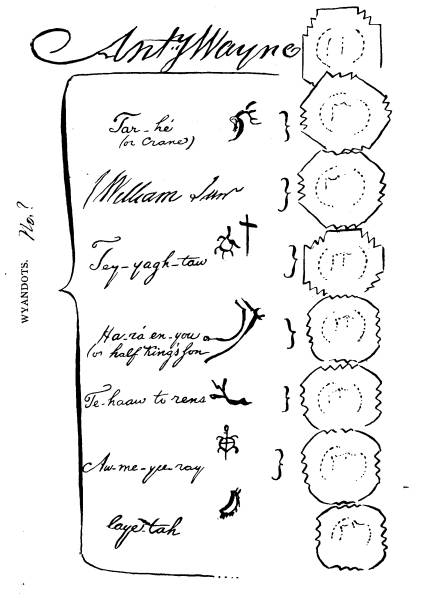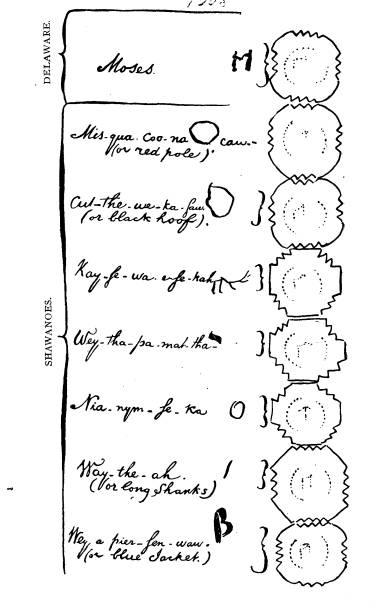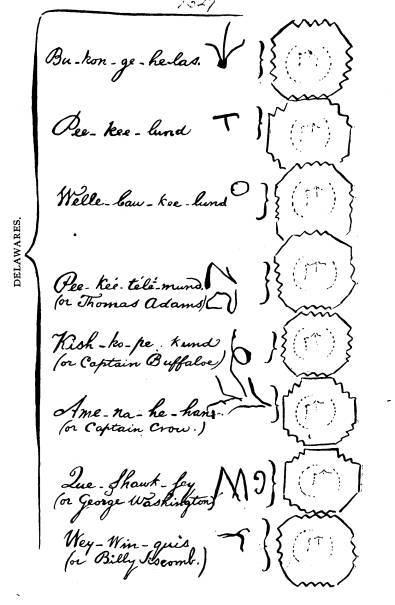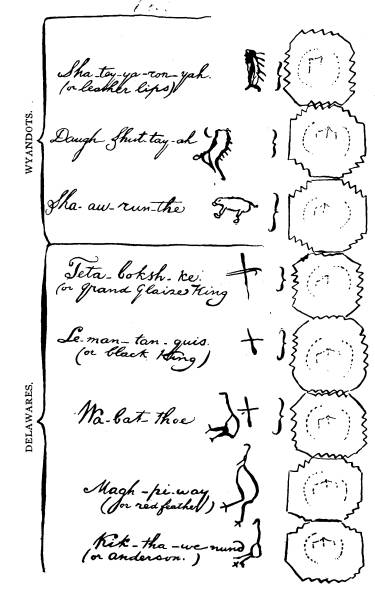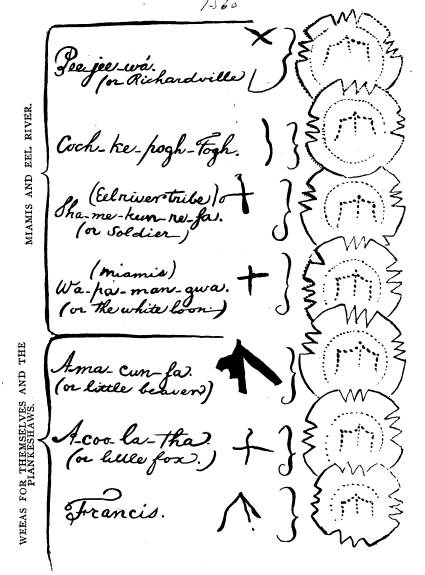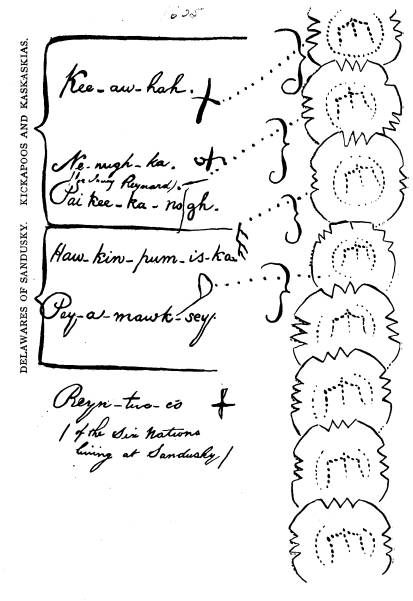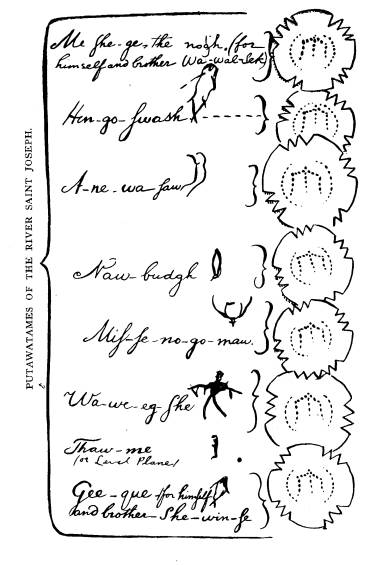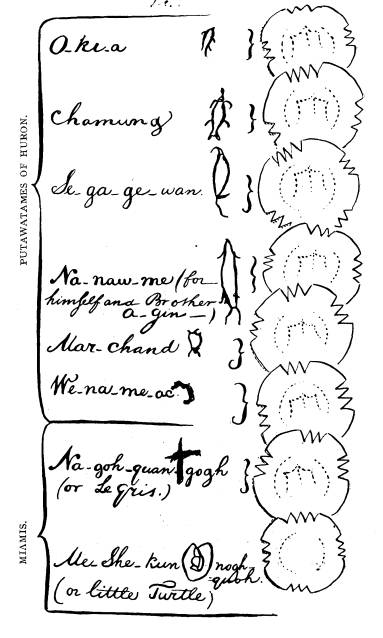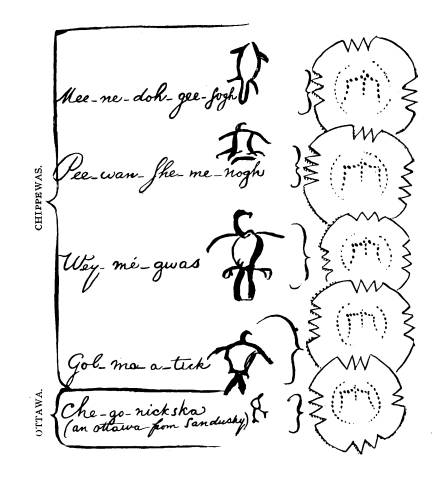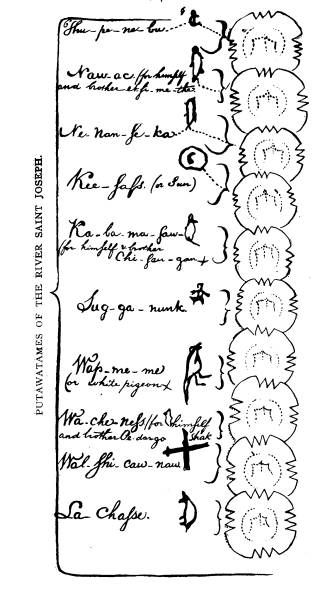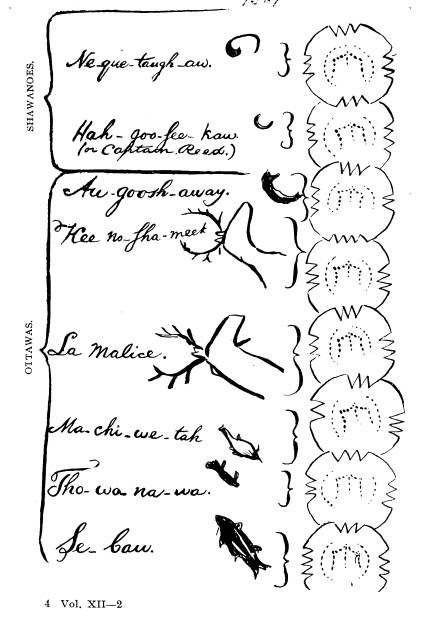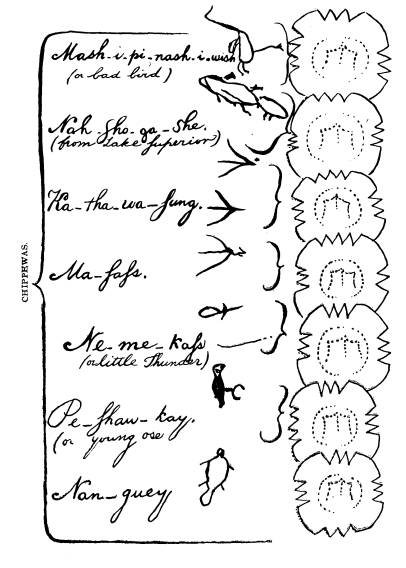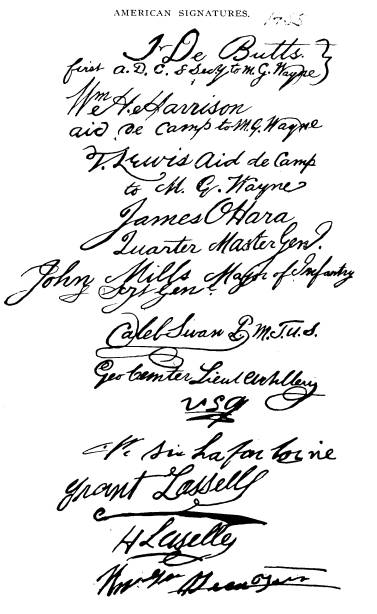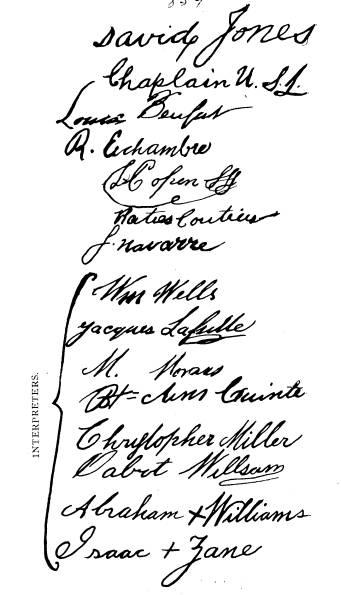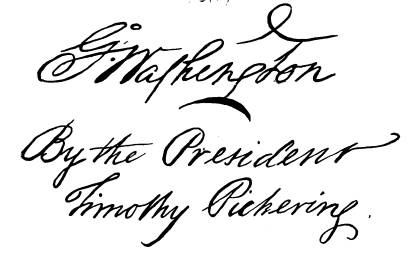Ohio History Journal
THE TREATY OF GREENVILLE.
[The following article comprising the
statement of facts, and the re-
print of the wording of the treaty, was
prepared by Frazer E. Wilson of
Greenville, Ohio. The material is found
largely in his little book, "The
Treaty of Greenville." The
reproduction of the signatures and the symbol
signs inscribed by the chiefs to the
treaty is from a photograph in exact
size taken from the treaty itself, now
carefully preserved in the archives
at Washington, D. C. The photograph was
taken by permission of the
government authorities for the purposes
of exhibition at the celebration
of the hundredth anniversary of the
treaty, held at Greenville, Ohio,
on August 3, 1895. This is the only time
a photograph has been made
from the original and the photograph is
now in the possession of Hon. A.
C. Robeson, Greenville, Ohio, by whose
consent we have been able to
produce the fac similes of the
signatures. - E. O. R.]
After the battle on the Maumee, the
Indians of the North-
west still hesitated to seek peace. The
British agents, Simcoe,
McKee, and Brant, stimulated them to
continue hostilities. They
strengthened their fort near the rapids,
supplied the Indians
from their magazines, called a council,
and urged the Indians
to propose a truce or suspension of
hostilities until spring, in
order to deceive the Americans, that
they might neglect to keep
sufficient troops to retain their
position. They also advised the
savages to convey their lands to the
King in trust, so as to give
the British a pretext for assisting
them, and, in case the Ameri-
cans refused to abandon all their posts
and possessions on the
west side of the Ohio, to make a general
attack and drive them
across that river. Brant also told them
to keep a good heart;
that he would return home, for the
present, with his warriors,
and come again in the spring, with a
larger force, "to fight, kill
and pursue the Americans." He also
"advised them to amuse
the Americans with a prospect of peace,
until the tribes should
collect in force to fall upon them early
in the spring, and when
least expected."
Notwithstanding all these preparations,
the Indians began
to understand their critical condition,
and to lose faith in the
British. Information was received from
Kaskaskia, that they
(128)
The Treaty of Greenville. 129
were crossing the Mississippi every day,
and despaired of with-
standing the Americans.
The humane disposition of the victors,
however, finally won
their confidence, and, on the 28th and 29th
of December, the
chiefs of several tribes manifested
their desire for peace to the
commandant at Fort Wayne. Proceeding to
Fort Greene Ville,
representatives of the Chippewas,
Ottawas, Sacs, Pottawattomies,
and Miamis entered, together with the
Shawanese, Delawares, and
Wyandots, into preliminary articles with
General Wayne on the
24th of January, 1795. The first article
provided, "that, until
articles for a permanent peace shall be
adjusted, agreed to, and
signed, all hostilities shall cease, and
the aforesaid sachems, and
war chiefs, for and in behalf of the
nations which they represent,
do agree to meet the above named
plenipotentiary of the United
States, at Greene Ville, on or about the
15th day of June next,
with all the sachems and war chiefs of
their nations, then and
there to consult and conclude upon such
terms of amity and
peace as shall be for the interest and
to the satisfaction of both
parties." Article two provided for
the prompt report of any
meditated or attempted hostilities of
any nation or tribe, against
any post or settlement, to the commander
in chief, or to the officer
commanding troops of the United States
at the nearest post,
should it come to the knowledge of the
nations above mentioned.
Also, that the commander in chief, and
his subordinate officers,
should do likewise on behalf of the said
Indian Nations.
For the next few months prisoners were
exchanged, and the
Indians were preparing to meet in June
as agreed. Early in that
month a large number of Delawares,
Ottawas, Pottawattomies,
and Eel River Indians, arrived at Greene
Ville. These were
the chief men, the scions of many a
proud and noted tribe. Some
had met in former treaties with the
United States, many had
helped to rout the unfortunate army of
St. Clair in 1791, and all
had suffered a telling defeat at the
hands of the Americans the
summer previous. Let us picture to
ourselves the scene and the
occasion and then listen to some of the
words of the principal
participants. The council fire was
kindled on the 16th of June
and around its sacred embers gathered a
picturesque group of
frontier soldiers, scouts, spies,
interpreters and officers. We note
130 Ohio Arch. and His. Society Publications.
especially the faces of Wayne, and W. H.
Harrison, his aide, of
Wells, Miller and Zane the scouts, and a
coterie of French Cana-
dian interpreters. Without the council
house and beyond the
artillery park and parade ground appear
the long and regular
rows of soldier's cabins and beyond
these, on all sides, the log
palisades and guarded bastions of the
frontier fort. Gen. Wayne
has extended a cordial greeting in these
words: "I have cleared
this ground of all brush and rubbish,
and opened roads to the
east, to the west, to the north, and to
the south, that all nations
may come in safety and ease to meet me.
The ground on which
the council house stands is unstained
with blood, and is as pure
as the heart of General Washington, the
great chief of America,
and of his great council - as pure as my
heart, which now wishes
for nothing so much as peace and
brotherly love. I have this
day kindled the council fire of the
United States; we will now
cover it up, and keep it alive, until
the remainder of the different
tribes assemble, and form a full meeting
and representation. I
now deliver to each tribe present a
string of white wampum, to
serve as record of the friendship that
is this day commenced be-
tween us."
For several weeks the chiefs and
warriors kept dropping in,
a few at a time from their distant homes
on the Wabash, the
Maumee, and the lake region farther
north. They expressed
sentiments of peace and on the 15th of July, the general, after
explaining his commission urged the last
treaty with St. Clair
at Ft. Harmar as a basis of lasting
peace and advised them to
deliberate a few days. The fire was then
raked up and the coun-
cil adjourned to the 18th. On that day
the Little Turtle observed
that the treaty at Ft. Harmar "was
effected altogether by the Six
Nations, who seduced some of our young
men to attend it, to-
gether with a few of the Chippewas,
Wyandots, Ottawas, Dela-
wares, and Pottawattomies," and
"that he was entirely ignorant
of what was done at that
treaty." Mash-i-pi-nash-i-wish
also
stated that he "knew nothing of the
treaty in question" on account
of his remote situation on Lake
Michigan. Tarke (or Crane), the
Wyandot chief, arose and remarked that
he wished it to be de-
termined what nation should speak, and
that a day be appointed
when all present, together with those on
the way, should meet.
The Treaty of Greenville. 131
The General answered that he had paid
attention to their
remarks, and that he would endeavor to
fully explain to them,
two days hence, the treaty of Muskingum,
(Ft. Harmar), of
which so many plead ignorance. Also,
that he would recall to
"the Wyandots, Delawares, Ottawas,
Chippewas, Pottawattomies,
and Sac nations, what they did at that
treaty," and show the
names of those who witnessed it. Council
adjourned to meet
on the 20th.
On the evening of the 18th, Blue Jacket
and thirteen Shaw-
anese, and Massas with twenty Chippewas,
arrived, and were
received into the council house. When
the council opened on
the 20th, the Shawanese and Chippewas
were present in addition
to the rest, and the General read to
them his message to the
hostile Indians on the 13th of August,
1794. He also read and
explained the treaty of Fort Harmar,'and
pointed out a number
of chiefs who were present and signed
both that and the treaty
of Fort McIntosh, and asked them to
consider seriously what he
had said, and upon their next meeting,
make known their
thoughts. After Pe-ke-te-le-mund, a
Delaware chief, and Mash-
i-pi-nash-i-wish had spoken, the council
adjourned, and on the
21st Massas spoke in behalf of the
Ottawas, Chippewas and Pot-
tawattomies. He spoke in favor of peace,
and stated that the
Three Fires which he represented had
poor interpreters at the
treaty of Muskingum, and that if their
uncles, the Wyandots,
and grandfathers, the Delawares, had
received presents and com-
pensation, they were never informed of
it. Tarke, Mash-i-pi-
nash-i-wish, the General, and Massas
then made some remarks.
On Wednesday, the 22nd, the tall and
crafty Mishikinakwa, the
Little Turtle, chief of the Miamis, who
had led in the attack on
St. Clair, arose and said: "General
Wayne! I hope you will pay
attention to what I now say to you. I
wish to inform you where
my younger brothers, the Miamis, live,
and also the Pottawatto-
mies of St. Joseph, together with the
Wabash Indians. You have
pointed out to us the boundary line
between the Indians and the
United States; but I now take the
liberty to inform you that that
line cuts off from the Indians a large
portion of country which
has been enjoyed by my fore-fathers,
time immemorial, without
molestation or dispute. The prints of my
ancestor's houses are
132 Ohio
Arch. and His. Society Publications.
everywhere to be seen in this portion. I
was a little astonished
at hearing you and my brothers who are
now present, telling
each other what business you had
transacted together, hereto-
fore, at Muskingum, concerning this
country. It is well known
that my forefather kindled the first
fire at Detroit; from thence
he extended his lines to the headwaters
of the Scioto; from thence
to its mouth; from thence down the Ohio
to the mouth of the
Wabash; and from thence to Chicago, on
Lake Michigan. At
this place I first saw my elder
brothers, the Shawanese. I have
now informed you of the boundaries of
the Miami nation, where
the great Spirit placed my forefather a
long time ago and charged
him not to sell, or part with his lands,
but to preserve them for
his posterity. This charge has been
handed down to me. I was
much surprised to hear that my brothers
differed so much from
me on this subject; for their conduct
would lead me to suppose
that the Great Spirit, and their
forefathers, had not given them
the same charge that was given to me;
but on the contrary, had
directed them to sell their lands to any
white man who wore a
hat, as soon as he should ask it of
them. Now, elder brother,
your younger brothers, the Miamis, have
pointed out to you
their country; and also to our brothers
present. When I hear
your remarks and proposals on this
subject, I will be ready to
give an answer. I came with an
expectation of hearing you say
good things, but I have not yet heard
what I expected.
"Brothers, the Indians! I expected,
in this council that our
minds would have been made up, and that
we should speak with
one voice. I am sorry to observe that
you are rather unsettled
and hasty in your conduct."
The bare record of these words is
scarcely sufficient to im-
press the reader as they must have
impressed the council. We
must imagine them delivered with
gestures similar to those used
lately by an old chief in the far
northwest which a witness de-
scribes as follows: "With a sweep
of his outstretched arm he
described the lands over which his
forefathers had roamed; a
pinch of earth between his thumb and
finger what was left to
him and his. A few kernels rattled in a
pod typified the Indians
remaining; a cloud of white winged seed
shaken upon the evening
breeze symbolized the coming race."
The Treaty of Greenville. 133
After the great chief had spoken, Tarke,
the Wyandot, arose
and said that the ground belonged to the
Great Spirit above, and
that they all had an equal right to it;
that he always considered
the treaty of Muskingum (Ft. Harmar) as founded upon the
fairest principles, as being binding
upon the Indians and the
United States alike; and that peace was
now desired by all.
On the 23rd Blue Jacket,
A-goosh-a-way, an Ottawa chief,
Massas, Mash-i-pi-nash-i-wish, and New
Corn addressed the
council and showed a desire to bury the
hatchet. On the 24th,
Blue Jacket opened the council and was
followed by the General,
who addressed the Ottawas, Chippewas,
and Pottawattomies, the
claimants of the land sold to the United
States at the last treaty,
for which they said that they had not
been compensated. He
remarked that it was always the
intention of the United States
"that the true owners of those
lands should receive full compen-
sation for them;" that if they had
not received a due proportion
of the goods delivered at that time, it
was not the fault of the
United States; and, that notwithstanding
these lands had been
twice paid for, once at Ft. McIntosh,
and again at Ft. Harmar,
yet the United States would be liberal
enough to pay for them
again. He then addressed the Miamis:
"Brothers, the Miamis!
I have paid attention to what the Little
Turtle said, two days
since, concerning the lands which he
claims. He said his father
first kindled the fire at Detroit and
stretched his line from thence
to the headwaters of the Scioto; thence
down the same to the
Ohio; thence down that river to the
mouth of the Wabash, and
from thence to Chicago, on the southwest
end of lake Michigan;
and observed that his forefathers had
enjoyed that country, un-
disturbed, from time immemorial.
"Brothers! These boundaries enclose
a very large space of
country indeed; they embrace, if I
mistake not, all the lands on
which all the nations now present live,
as well as those which have
been ceded to the United States. The
lands which have been
ceded have within these three days been
acknowledged by the
Ottawas, Chippewas, Pottawattomies,
Wyandots, Delawares, and
Shawanese. The little Turtle says the
prints of his forefathers'
houses are everywhere to be seen within
these boundaries.
Younger brother! it is true these prints
are to be observed, but
134 Ohio Arch. and His. Society Publications.
at the same time we discover the marks
of French possessions
throughout this country, which were
established long before we
were born. These have since been in the
possession of the British,
who must, in their turn, relinquish them
to the United States,
when they, the French and the Indians,
will be all as one people.
"I will point out to you a few
places where I discover strong
traces of these establishments; and
first of all, I find at Detroit,
a very strong print, where the fire was
first kindled by your fore-
fathers; next at Vincennes on the
Wabash; again at Musquiton,
on the same river; a little higher up on
that stream, they are to
be seen at Quitanon. I discover another
strong trace at Chicago;
another on the St. Joseph's, of Lake
Michigan. I have seen
quite distinctly, the prints of a French
and of a British post, at
the Miami villages, and of a British
post at the foot of the Rapids,
now in their possession. Prints, very
conspicuous, are on the
Great Miami, which were possessed by the
French, forty-five
years ago; and another trace, is very
distinctly to be seen at
Sandusky.
"It appears to me, that if the
Great Spirit, as you say,
charged your fore-fathers to preserve
their lands entire, for their
posterity, they have paid very little
regard to the sacred injunc-
tion, for I see they have parted with
those lands to your fathers
the French - and the English are now,
or have been, in posses-
sion of them all: therefore, I think the
charge urged against the
Ottawas, Chippewas and other Indians,
comes with a bad grace
indeed from the very people who perhaps,
set them the example,
The English and French both wore hats;
and yet your fore-
fathers sold them, at various times,
portions of your lands. How-
ever, as I have already observed, you
shall now receive from the
United States further valuable
compensation for the lands you
have ceded to them by former treaties.
"Younger brothers! I will now
inform you who it was who
gave us these lands in the first
instance;- it was your fathers the
British, who did not discover that care
for your interests which
you ought to have experienced. This is
the treaty of peace, made
between the United States of America and
Great Britain, twelve
years ago, at the end of a long and
bloody war, when the French
and Americans proved too powerful for
the British; on these
The Treaty of Greenville. 135
terms they obtained peace. (Here part of
the treaty of 1783
was read.)
"Here you perceive, that all the
country south of the great
lakes has been given up to America; but
the United States never
intended to take that advantage of you,
which the British placed
in their hands; they wish you to enjoy
your just rights, without
interruption, and to promote your
happiness. The British stipu-
lated to surrender to us all the posts
on this side of the boundary
agreed on. I told you some days ago,
that treaties should ever
be sacredly fulfilled by those who make
them; but the British,
on their part, did not find it
convenient to relinquish those posts
as soon as they should have done;
however, they now find it so,
and a precise period is fixed for their
delivery. I have now in
my hands the copy of a treaty, made
eight months since, between
them and us, of which I shall read you a
little. (First and second
articles of Mr. Jay's treaty read.)
"By this solemn agreement they
promise to retire from Mich-
ilimackinac, Fort St. Clair, Detroit,
Niagara, and all other places
on this side of the lakes, and leave the
same to the full and quiet
possession of the United States.
"Brothers! All nations present, now
listen to me!
"Having now explained those matters
to you and informed
you of all things I judged necessary for
your information, we
have nothing to do but to bury the
hatchet, and draw a veil over
past misfortunes. As you have buried our
dead with the con-
cern of brothers, so I now collect the
bones of your slain warriors,
put them into a deep pit which I have
dug, and cover them
carefully over with this large belt,
there to remain undisturbed.
I also dry the tears from your eyes, and
wipe the blood from your
bodies, with this soft, white linen. No
bloody traces will ever
lead to the graves of your departed
heroes; with this I wipe all
such away. I deliver it to your uncle,
the Wyandot, who will
send it round amongst you. (A large
belt, with a white string
attached.)
"I now take the hatchet out of your
hands, and with a strong
arm, throw it into the centre of the
great ocean, where no mortal
can ever find it; and I now deliver to
you the wide and straight
path to the fifteen fires, to be used by
you and your posterity,
136 Ohio Arch. and His. Society Publications.
forever. So long as you continue to
follow this road, so long
will you continue to be a happy people.
You see it is straight
and wide, and they will be blind indeed,
who deviate from it.
I place it also in your uncle's hands,
for you. (A large road
belt.)
"I will, the day after to-morrow,
show you the cessions which
you have made to the United States, and
point out to you the
lines which may, for the future, divide
your lands from theirs;
and as you will have to-morrow to rest,
I will order you a double
allowance of drink, because we have now
buried the hatchet and
performed every necessary ceremony, to
render propitious, our
renovated friendship."
Discussion and explanation continued
until the 3rd of August.
On that day the council assembled to
sign the treaty. Gen-
eral Wayne again read his commissions
and explained his author-
ity for holding the same, said that he
had fulfilled his instructions,
and then read for the third time the
articles of the treaty which
had been engrossed. The chiefs then
signed and were informed
that one part should be delivered to the
Wyandots for preser-
vation, the other, to the Great Chief,
General Washington, and
that in addition each nation should
receive one copy; also, that
the goods to be given them would now be
apportioned and de-
livered in a few days.
The Indians remained a few days at Greene Ville for
the distribution of presents; speeches
were delivered and the
calumet of peace was finally passed to
those who had not yet
smoked it. Thus was consummated a treaty
of far reaching
importance concerning the effectiveness
of which Rufus King,
the historian, testifies-"Never
after that treaty, to their honor
be it remembered, did the Indian nations
violate the limits which
it established. It was a grand tribute
to General Wayne that
no chief or warrior who gave him the
hand at Greene Ville ever
after 'lifted the hatchet' against the
United States. There were
malcontents on the Wabash and Lake
Michigan who took sides
with Tecumseh and the Prophet in the war
of 1812, perhaps for
good cause, but the tribes and their
chiefs sat still."
The number of the different nations at
and parties to the
treaty were as follows: Wyandots, 180;
Delawares, 381; Shaw-
The Treaty of Greenville. 137
anese, 143; Ottawas, 45; Chippewas, 46;
Pottawattomies, 240;
Miamis, and Eel Rivers, 73; Weas and
Piankeshaws, 12; Kicka-
poos and Kaskaskias, 1O; making a total
of 1130.
The treaty was neatly engrossed on three
pieces of parchment
26 inches wide and from 25 to 31 inches
long. It reads as
follows:
GEORGE WASHINGTON, PRESIDENT OF
THE UNITED STATES OF
AMERICA:
To all to whom these presents shall
come- Greeting.
WHEREAS, a Treaty of peace and
friendship between the
United States of America and the tribes
of Indians called the
Wyandots, Delawares, Shawanoes, Ottawas,
Chippewas, Putawa-
tames, Miamis, Eel River, Weea's,
Kickapoos, Piankashaws and
Kaskaskias was made and concluded on the
third day of August
one thousand seven hundred and
ninety-five by Anthony Wayne,
Major-General commanding the Army of the
United States, duly
authorized thereto, on the one part, and
the Sachems and war
chiefs of the beforementioned Nations
and Tribes of Indians
whose names are thereunto signed on the
other part which Treaty
is in the form and words following, viz:
A TREATY OF PEACE between the UNITED
STATES OF AMER-
ICA and the Tribes of INDIANS called the Wyandots,
Delawares,
Shawanoes, Ottowas, Chippewas,
Putawatimes, Miamis, Eel
River, Weea's Kickapoos, Piankashaws and
Kaskaskias.
To put an end to a destructive war to
settle all controver-
sies and to restore harmony and a
friendly intercourse between
the said United States and Indian
Tribes, Anthony Wayne,
Major-General commanding the Army of the
United States and
sole Commissioner for the good purposes
above mentioned, and
the said tribes of Indians, by their
Sachems, Chiefs and Warriors
met together at Greene Ville the Head
Quarters of the said Army
have agreed on the following Articles,
which when ratified by the
President with the advice and consent of
the Senate of the United
States shall be binding on them and the
said Indian Tribes.
"ARTICLE 1ST. Henceforth
all hostilities shall cease; peace
is hereby established, and shall be
perpetual; and a friendly inter-
138 Ohio Arch. and His. Society Publications.
course shall take place between the said
United States and In-
dian Tribes.
"ARTICLE 2ND. All prisoners shall, on both sides, be re-
stored. The Indians, prisoners to the
United States, shall be im-
mediately set at liberty. The people of
the United States, still re-
maining prisoners among the Indians,
shall be delivered up in
ninety days from the date hereof, to the
General or commanding
officer at Greene Ville, Fort Wayne, or
Fort Defiance; and ten
chiefs of said tribes shall remain at
Greene Ville as hostages until
the delivery of the prisoners shall be
effected.
"ARTICLE 3RD. The general
boundary line, between the
lands of the United States and the lands
of the said Indian tribes,
shall begin at the mouth of the Cuyahoga
River, and run thence
up the same, to the portage between that
and the Tuscarawas
branch of the Muskingum; thence, down
that branch to the cross-
ing place, above Fort Lawrence; thence
Westerly, to a fork of
that branch of the Great Miami River
running into the Ohio, at
or near which fork stood Loramie's
store, and where commences
the portage between the Miami of the
Ohio, and St. Mary's
River, which is a branch of the Miami,
which runs into Lake
Erie; thence, a westerly course to Fort
Recovery, which stands
on a branch of the Wabash; thence, South
Westerly in a direct
line to the Ohio, so as to intersect
that river, opposite the mouth
of the Kentucke, or Cuttawa river. And
in consideration of the
peace now established, of the goods
formerly received from the
United States, of those now to be
delivered, and of the yearly
delivery of goods now stipulated to be
made hereafter, and to
indemnify the United States for the
injuries and expences they
have sustained during the War, the said
Indian tribes do here-
by cede and relinquish forever, all
their claims to the lands lying
Eastwardly and Southwardly of the
general boundary line, now
described; and these lands, or any part
of them, shall never here-
after be made a cause or pretence, on
the part of said Indian
Tribes, or any of them, of war or injury
to the United States, or
any of the people thereof.
"And for the same considerations,
and as an evidence of the
returning friendship of the said Indian
tribes, of their confidence
in the United States, and desire to
provide for their accommoda-
The Treaty of Greenville. 139
tion, and for that convenient
intercourse which will be beneficial
to both parties, the said Indian tribes
do also Cede to the United
States, the following pieces of land, to
wit: 1. One piece of
land, six miles square, at or near
Loramie's store; before men-
tioned. 2. One piece two miles square, at
the head of the navig-
able water or landing on the St. Mary's
river, near Girty's Town.
3. One piece six miles square, at the
head of the navigable
water of the Au Glaize River. 4. One
piece six miles square,
at the confluence of the Au Glaize and
Miami Rivers, where Fort
Defiance now stands. 5. One piece six
miles square, at or near
the confluence of the Rivers St. Mary's
and St. Joseph's, where
Fort Wayne now stands, or near it. 6.
One piece two miles
square, on the Wabash river, at the end
of the portage from the
Miami of the Lake, and about eight miles
westward from Fort
Wayne. 7. One piece six miles square, at
the Ouiatenon, or
old Wee'a Towns, on the Wabash river. 8.
One piece twelve
miles square, at the British fort, on
the Miami of the Lake, at
the foot of the rapids. 9. One pice six
miles square, at the
mouth of the said River, where it
empties into the Lake. 10. One
piece six miles square upon Sandusky
Lake where a Fort formerly
stood. 11. One piece two miles
square at the lower rapids of
Sandusky River. 12. The Post of
Detroit, and all the lands to
the North, the West, and the South of
it, of which the Indian
title has been extinguished by gifts or
grants to the French or
English Governments; and so much more
land, to be annexed to
the district of Detroit, as shall be
comprehended between the
River Rosine, on the South, Lake St.
Clair, on the North, and a
line, the general course whereof shall
be six miles distant from
the West end of Lake Erie and Detroit
river. 13. The Post
of Michilimackinac, and all the land on
the Island on which
that Post stands, and the main land
adjacent, of which the Indian
title has been extinguished by Gifts or
grants to the French or
English Governments; and a piece of land
on the main, to the
north of the Island, to measure six
miles on Lake Huron, or the
Streight between Lake Huron and
Michigan, and to extend three
miles back from the water of the Lake or
Streight; and, also the
Island de Bois Blanc, being an extra and
Voluntary gift of the
3 Vol. XI --2
140 Ohio Arch. and His.
Society Publications.
Chippewa Nation. 14. One piece of land
six miles square, at
the mouth of the Chikago River, emptying
into the South West
end of Lake Michigan where a Fort
formerly stood. 15. One
piece twelve miles square, at or near
the mouth of the Illinois
River, emptying into the Mississippi.
16. One piece six miles
square, at the old Piorias fort and
Village, near the South end
of the Illinois Lake, on said Illinois
River. And whenever the
United States shall think proper to
survey and mark the boun-
daries of the lands hereby ceded to
them, they shall give
timely notice thereof to the said Tribes
of Indians, that they may
appoint some of their wise chiefs, to
attend and see that the lines
are run according to the terms of this
treaty.
"And the said Indian tribes will
allow to the people of the
United States, a free passage by land
and by Water, as one and
the other shall be found convenient thro
their Country, along
the chain of Posts herein before
mentioned; that is to say, from
the commencement of the portage
aforesaid, at or near Loramie's
store, thence along said portage to the
St. Mary's, and down the
same to Fort Wayne, and then down the
Miami to Lake Erie-
again, from the commencement of the
portage at or near Lora-
mie's store, along the portage from
thence to the river Au Glaize,
and down the same to its junction with
the Miami at Fort Defi-
ance; again, from the commencement of
the portage aforesaid,
to Sandusky River, and down the same to
Sandusky bay and
Lake Erie, and from Sandusky to the post
which shall be taken
at or near the foot of the rapids of the
Miami of the Lake; and
from thence to Detroit-again, from the
mouth of the Chikago,
to the commencement of the portage,
between that River and the
Illinois, and down the Illinois River to
the Mississippi-also, from
Fort Wayne, along the portage aforesaid,
which leads to the
Wabash, and then down the Wabash to the
Ohio-and the said
Indian tribes will, also, allow to the
people of the United States,
the free use of the harbours and mouths
of Rivers along the Lakes
adjoining the Indian lands, for
sheltering Vessels and boats, and
liberty to land their cargoes where
necessary for their Safety.
"ARTICLE 4TH. In consideration of
the peace, now estab-
lished, and of the cessions and
relinquishments of lands made in
the preceding article by the said tribes
of Indians, and to manifest
The Treaty of Greenville. 141
the liberality of the United States, as
the great means of render-
ing this peace strong and perpetual, the
United States relinquish
their claims to all other Indian lands,
Northward of the river
Ohio, eastward of the Mississippi, and
westward and southward
of the Great Lakes, and the waters
uniting them; according to the
boundary line agreed on by the United
States and King of Great
Britain, in the treaty of peace, made
between them in the Year
1783. But, from this relinquishment by
the United States, the
following tracts of land are explicitly
excepted. 1st. The Tract
of One hundred and fifty thousand acres,
near the rapids of the
Ohio, which has been assigned to General
Clark, for the use of
himself and his Warriors. 2d. The post
of St. Vincennes, on the
river Wabash, and the lands adjacent, of
which the Indian title
has been extinguished. 3rd. The lands at
all other places in
possession of the French people, and
other white Settlers among
them, of which the Indian title has been
extinguished, as men-
tioned in the 3rd Article. And 4th, the
Post of Fort Massac, to-
words the mouth of the Ohio. To which
several parcels of lands,
so excepted, the said tribes relinquish
all the title and Claim which
they or any of them may have.
"And for the same considerations,
and with the same Views
as above mentioned, the United States
now deliver to the said
Indian tribes, a quantity of goods, to
the value of Twenty thou-
sand Dollars, the receipt whereof they
do hereby acknowledge;
and henceforth, every year, forever, the
United States will deliver,
at some convenient place northward of
the river Ohio, like use-
ful goods, suited to the circumstances
of the Indians, of the value
of nine thousand five hundred dollars;
reckoning that value at
the first cost of the Goods in the city
or place, in the United States,
where they shall be procured. The tribes
to which these goods
are to be annually delivered, and the
proportions in which they
are to be delivered, are the following:
1st. To the Wyandots,
the amount of one thousand dollars. 2nd.
To the Delawares,
the amount of one thousand dollars. 3rd.
To the Shawanoes,
the amount of one thousand dollars. 4th.
To the Miamis, the
amount of one thousand dollars. 5th.
To the Ottawas, the
amount of one thousand dollars. 6th. To
the Chippewas, the
amount of one thousand dollars. 7th. To the Putawatimes,,
142 Ohio Arch. and His. Society Publications.
the amount of one thousand dollars. 8th.
And to the Kicka-
poo, Weea, Eel River, Piankashaw, and
Kaskaskias tribes, the
amount of five hundred dollars, each.
Provided, that if either
of the said tribes shall, hereafter, at
an annual delivery of their
share of the goods aforesaid, desire
that a part of their annuity
should be furnished in domestic animals,
implements of hus-
bandry, and other Utensils convenient
for them, and in compen-
sation to useful artificers, who may
reside with, or near them,
and be employed for their benefit, the
same shall, at the subse-
quent annual deliveries, be furnished
accordingly.
"ARTICLE 5TH. To prevent any
misunderstanding about the
Indian lands relinquished by the United
States in the fourth
article, it is now explicitly declared,
that the meaning of that
relinquishment is this: The Indian
tribes who have a right to
those lands, are to quietly enjoy them,
hunting, planting and dwell-
ing thereon, so long as they please,
without molestation from the
United States; but when those tribes, or
any of them, shall be
disposed to sell their lands, or any
part of them, they are to
be sold only to the United States; and
until such sale, the United
States will protect all the said Indian
tribes in the quiet enjoy-
ment of their lands, against all
Citizens of the United States, and
against all other white persons who
intrude upon the same. And
the said Indian tribes, again
acknowledge themselves to be under
the protection of the Said United
States, and no other power
whatever.
"ARTICLE 6TH. If any Citizen of the United States, or any
other white person or persons, shall
presume to settle upon the
lands, now relinquished by the United
States, such citizen or
other person shall be out of the
protection of the United States;
and the Indian tribe, on whose land the
Settlement shall be made,
may drive off the Settler, or punish him
in such manner as they
shall think fit; and because such
settlements, made without the
consent of the United States, will be
injurious to them, as well
as to the Indians; the United
States shall be at liberty to break
them up, and remove and punish the
settlers as they shall think
proper, and so effect that protection of the Indian lands here-
inbefore stipulated.
The Treaty of Greenville. 143
"ARTICLE 7TH. The said tribes of
Indians, parties to this
Treaty, shall be at liberty to hunt
within the territory and lands
which they have now ceded to the United
States, without hind-
rance or molestation, so long as they
demean themselves peace-
ably, and offer no injury to the people
of the United States.
"ARTICLE 8TH. Trade shall be
opened with the said Indian
tribes; and they do hereby respectively
engage to afford protec-
tion to such persons, with their
property, as shall be duly licensed
to reside among them, for the purpose of
trade, and to their
Agents and Servants; but no person shall
be permitted to reside
at any of their towns or hunting camps,
as a trader, who is not
furnished with a license for that
purpose, under the hand and
seal of the superintendent of the
Department northwest of the
Ohio, or such other person as the
President of the United.States
shall authorize to grant such licenses,
to the end that the said In-
dians may not be imposed on in their
trade. And, if any licensed
trader shall abuse his privilege by
unfair dealing, upon complaint
and proof thereof, his license shall be
taken from him, and he
shall be further punished according to
the laws of the United
States. And if any person shall intrude
himself as a trader, with-
out such license, the said Indians shall
take and bring him before
the superintendent, or his deputy, to be
dealt with according to
law; and, to prevent impositions by
forged licenses, the said In-
dians shall at least once a year, give
information to the superin-
tendent, or his deputies, of the names
of the traders residing
among them.
"ARTICLE 9TH. Lest the firm peace
and friendship now
established should be interrupted by the
misconduct of individu-
als, the United States and the said
Indian tribes agree that for
injuries done by individuals, on either
side, no private revenge
or retaliation shall take place; but,
instead thereof, complaint
shall be made by the party injured, to
the other, by the said
Indian tribes, or any of them, to the
President of the United
States, or the Superintendent by him
appointed; and by the
Superintendent or other person appointed
by the President,
to the principle chiefs of the said
Indian tribes, or of the tribe to
which the offender belongs, and such
prudent measures shall then
be pursued, as shall be necessary to
prserve the said peace and
144 Ohio Arch. and His. Society Publications.
friendship unbroken, until the
Legislature (or Great Council) of
the United States shall make other
equitable provision in the case,
to the satisfaction of both
parties-should any Indian tribes
meditate a War against the United
States, or either of them and
the same shall come to the knowledge of
the before mentioned
tribes or either of them they do hereby
engage to give immediate
notice thereof to the General or Officer
commanding the troops
of the United States, at the nearest
post. And should any tribe,
with hostile intentions against the
United States, or either of
them, attempt to pass through their
country, they will endeavor to
prevent the same, and in like manner
give information of such
attempt, to the general, of officer
commanding, as soon as pis-
sible, that all causes of Mistrust and
Suspicion may be avoided
between them and the United States. In
like manner, the United
States shall give notice to the said
Indian tribes of any harm
that may be meditated against them, or
either of them, that shall
come to their knowledge, and do all in
their power to hinder and
prevent the same, that the Friendship
between them may be Un-
interrupted.
"ARTICLE 1OTH. All other Treaties heretofore made between
the United States and the said Indian
tribes, or any of them,
since the treaty of 1783, between the
United States and Great
Britain, that come within the purview of
this treaty, shall hence-
forth cease, and become Void.
"In testimony whereof, the said
Anthony Wayne, and the
Sachems and War Chiefs of the before
mentioned nations and
tribes of Indians, have hereunto set
their hands and affixed their
seals.
"Done at Greene Ville, in the
Territory of the United States
northwest of the River Ohio, on the
third day of August, one
thousand seven hundred and ninety-five.
|
The Treaty of Greenville. 145 |
|
|
|
146 Ohio Arch. and His. Society Publications. |
|
|
|
The Treaty of Greenville. 147 |
|
|
|
148 Ohio Arch. and His. Society Publications. |
|
|
|
The Treaty of Greenville. 149 |
|
|
|
150 Ohio Arch. and His. Society Publications. |
|
|
|
The Treaty of Greenville. 151 |
|
|
|
152 Ohio Arch. and His. Society Publications. |
|
|
|
The Treaty of Greenville. 153 |
|
|
|
154 Ohio Arch. and His. Society Publications. |
|
|
|
The Treaty of Greenville. 155 |
|
|
|
156 Ohio Arch. and His. Society Publications. |
|
|
|
The Treaty of Greenville. 157 |
|
|
|
158 Ohio Arch. and His. Society Publications. |
|
|
|
The Treaty of Greenville. 159
Now KNOW YE, That I having seen and considered the said Treaty do by and with the advice and consent of the Senate of the United States, accept, ratify, and confirm the same and every article and clause thereof. In testimony whereof I have caused the seal of the United States to be hereunto affixed and signed the same with my hand. Given at the city of Philadelphia the twenty-second day of December in the year of our Lord One thousand seven hundred and ninety-five and in the twentieth year of the sovereignty and independence of the United States. |
|
|
